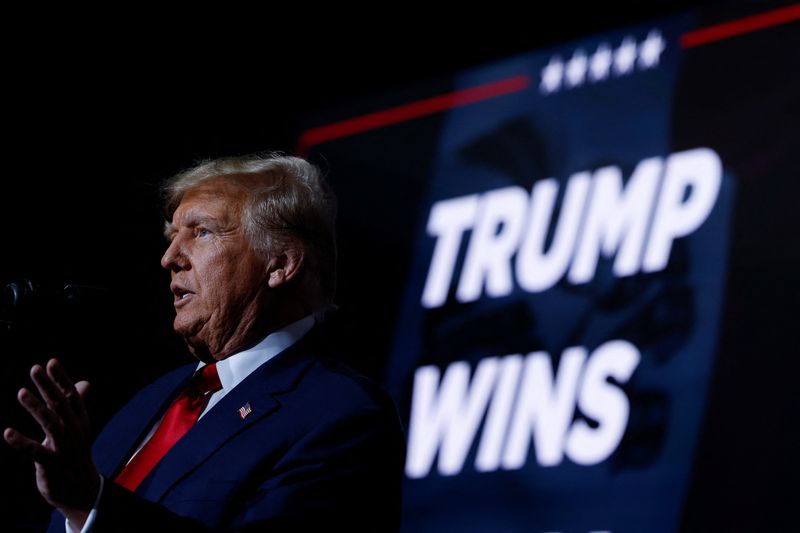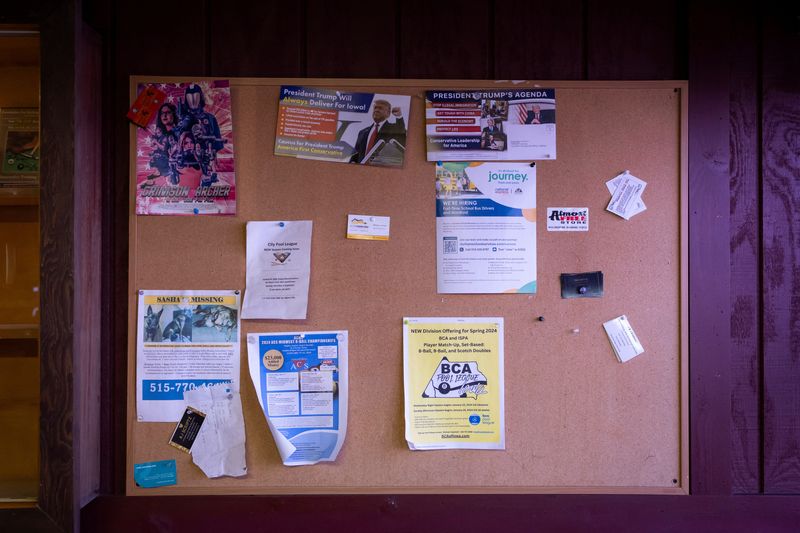By James Oliphant
(Reuters) -Former President Donald Trump trounced his Republican rivals on Monday in the first nominating contest of the 2024 election, leaving his top rivals with more questions than answers about the path forward for their candidacies.
Here are takeaways from the Iowa caucus:
MIND MADE UP
According to surveys conducted of Iowa caucus-goers, the frontrunner Trump was never in danger of losing.
An overwhelming majority of caucus-goers – 64% - made the decision on which candidate to support before this month. Of those voters, 64% went for Trump, entrance polls by Edison Research showed, making all the late-stage campaigning by rivals Ron DeSantis and Nikki Haley almost futile.
Trump was positioned to dominate a rural state with a large white, working-class population, and Edison’s numbers bore that out: He won 73% of voters who said they never attended college and 54% of those age 45 and over. He won with those who consider themselves very conservative and somewhat conservative. He won a plurality of independent voters.
Trump captured 61% of Republicans who said their top priority was immigration and 52% of those most worried about the economy.
Even more telling: Of the 65% of caucus-goers who do not believe President Joe Biden was legitimately elected, 69% went for Trump. And 63% of Republicans surveyed said Trump, who faces criminal charges in federal and state courts for attempting to subvert the 2020 election, would be fit to be president even if convicted of a crime.
The numbers validated Trump's approach to Iowa. His campaign never took the state for granted, but neither did it ever approach the caucuses as a must-win. Only in recent weeks did Trump step up his presence, and he held just one rally during the final weekend.
If there was a drawback for Trump, it was that neither DeSantis nor Haley looked likely to drop out of the race before New Hampshire's primary on Jan. 23, meaning that he didn't quite swing the knockout blow he was hoping for.
A LOSING BET
Florida Governor DeSantis has long staked his success in Iowa on courting Iowa's critical Christian conservative voting bloc.
But the entrance polling showed Trump with nearly more than twice the support of the state's evangelical voters over DeSantis, 51% to 29%.
DeSantis spent months lining up endorsements from Christian leaders such as Bob Vander Plaats and touring rural enclaves where they held sway.
He embraced a hardline stand on abortion, backing a ban on the procedure at six weeks while Trump suggesting a more flexible standard.
DeSantis went so far as to accuse Trump, who as president helped assemble the U.S. Supreme Court majority that overturned constitutional protection for abortion, of being insufficiently “pro-life.” DeSantis formed a coalition of pastors who were charged with persuading Trump’s voters to switch sides.
He often spoke at rallies about strapping on "the armor of God." He inveighed against policies that supported transgender rights.
It didn’t work.
DeSantis won the overwhelming majority of caucus-goers who named abortion as their top issue, according to Edison, but those voters comprised just 12% of the electorate. For evangelicals who were more concerned about immigration, foreign policy or the economy, Trump was easily their top choice.
DeSantis tried to replicate the strategy U.S. Senator Ted Cruz employed when he narrowly beat Trump in Iowa in 2016. He poured the bulk of his time, energy and resources into the state.
But having served a term as president, Trump is now more popular with Iowans than he was then. DeSantis was forced to settle for a distant second place while asserting that he would press on.
MEET HER IN THE MIDDLE
Haley, a former U.N. ambassador under Trump, ended up a third-place finisher in Iowa far behind Trump and trailing DeSantis – but there was a possible silver lining as she looks toward the New Hampshire primary.
Haley was clearly the favorite of moderate and highly educated Republican voters, according to Edison.
New Hampshire, which allows independent voters to vote in the primary, offers Haley a chance to capitalize on that. The state also has received a flood of affluent Republicans from the greater Boston area in recent years.
Polls have shown Haley within striking distance of Trump in the state, and her well-funded campaign has been showering local TV stations with ads.
In Iowa, according to Edison, Haley crushed Trump and DeSantis among voters who consider themselves moderates, garnering 64% of the vote. She ran a close second to Trump among independents, 41% to 35%.
She was also the top choice among Republicans with an advanced degree.
Her background was an asset: She was the favorite among Iowa Republicans who said foreign policy was their top concern. She ran weakest among voters who prioritized immigration.
Haley and her allied super PAC spent the most money of all the candidates in Iowa, nearly $40 million, according to Ad Impact, a firm that tracks political spending. To that end, a third-place finish has to be viewed as a disappointment.

But she remains in a decent position to compete in New Hampshire and move on to the Feb. 24 primary in South Carolina, where she served two terms as governor.
Plus, Haley's top antagonist during last year's Republican debates, Vivek Ramaswamy, said on Monday he was dropping out of the race after finishing fourth. That had to give her some satisfaction.
